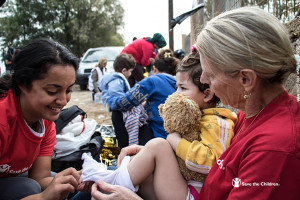 I am just back from the island of Lesvos in the southeastern part of Greece, where I was visiting our programs for refugees who have made the perilous crossing from Turkey. It is a surreal experience: on the one hand a beautiful island with lovely small towns where vacationers from Europe flock in the summer months; on the other hand, a beach strewn with deflated rafts, substandard lifejackets and water bottles, with soaked families huddled together after a rough journey across the strait from Turkey. This far-flung island off of Greece is now the first landing point for thousands of refugees fleeing from Syria, Afghanistan and Iraq.
I am just back from the island of Lesvos in the southeastern part of Greece, where I was visiting our programs for refugees who have made the perilous crossing from Turkey. It is a surreal experience: on the one hand a beautiful island with lovely small towns where vacationers from Europe flock in the summer months; on the other hand, a beach strewn with deflated rafts, substandard lifejackets and water bottles, with soaked families huddled together after a rough journey across the strait from Turkey. This far-flung island off of Greece is now the first landing point for thousands of refugees fleeing from Syria, Afghanistan and Iraq.
The trip can be deadly for children. The night I arrived in Lesvos, a one-year-old died in the chaos when he fell into the middle of an overcrowded raft packed with more than 30 people. In the dark, the baby drowned in a few feet of water before his mother could find him in the jumble of people.
As I sat and talked to families waiting in line for a bus which would take them down the coast to the registration camp, I was struck by the enormous hardships these families had endured along the way – and the fact that this is only their first stop in a long journey through Europe’s many borders. Many had been first displaced in their own countries by conflict, often living for years under fire, experiencing danger and violence on a regular basis. Finally they felt unable to endure another day of fear, lack food or medical services and no school for their children. They had all made the difficult decision to use all their remaining resources to try to start new lives in Europe.
Their journeys through Iran, Turkey, Lebanon and other routes were often marred by tragedy. One mother and grandmother cried as they described to me leaving behind a 9-year-old boy who was separated at the Lebanon/Turkey border and was denied a visa to cross with them. Another young mother told me about the birth of her 14-day-old baby while they were in Iran – on the way to Turkey from Iraq – with no hospital or help available. Despite her advanced pregnancy, she and her husband were forced to flee from ISIS and a life of constant danger. And parent after parent told me that their children had now been out of school for years and they needed to give them their future back.
In the face of this massive wave of people (more than 160,000 reached Lesvos in the month of September alone), Save the Children has been working to make lives easier. Rather than enduring the 40-mile walk, often in brutal temperatures, from where the boats land to the registration camp, Save the Children and other partners have rented buses to take families down the mountainous road. Once at the camp, we distribute hygiene kits and blankets for mothers and children who come with almost nothing but will be facing Europe’s cold winter temperatures. We have our signature child-friendly space set up so that kids can spend even a few hours playing games, getting colorful drawings painted on to their faces. These spaces bring a smile to a child that has often not smiled for many months. We also look for those children having the hardest time coping and refer them for more help. And each afternoon, we supply a cooked meal to over 3,000 people – often the only meal they may get that day.
The young staff here from all over the world are tremendously hard working, living together and working all hours seven days a week – they seem to never stop thinking about ways they can make our work better and respond to ever-changing demands. As those fleeing war and persecution continue to arrive, we must all remain committed to meeting their needs to the best of our ability – so that these children don’t have to spend more of their young lives in fear.
I am struck by one little boy I met on Lesvos named Hassan, who told me that what he wanted more than anything was to have a home again, and to not be scared. Surely this most basic request is not too much for a little boy, only 8, to ask of us.

